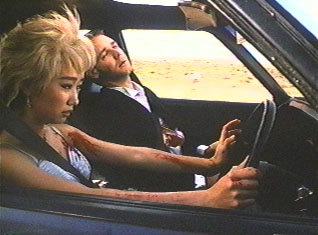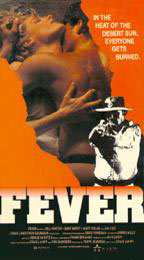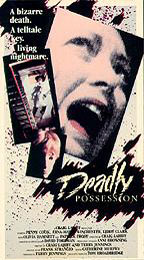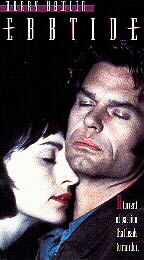| Heaven's
Burning
by Eleanor f Chaos |
 |
|
'Vengeance takes no prisoners' This page is the work of Eleanor
F Chaos - May, 2002 - email
me
|
|
|
||||
CONTENTS
Click on a link to go to that section of the page.
To return to the Contents, click on any link called 'Go to Contents'.
| Director | Craig Lahiff |
| Script | Louis Nowra |
| Music | Graham Koehne & Michael Atkinson |
| Director of Photography | Brian Breheny |
| Film Editor | John Scott |
| Producers | Al Clark & Helen Leake |
| Executive Producers | Craig Lahiff & Georgina Pope |
| Production Companies |
Australian Film Finance Corporation |
|
Distribution |
Polygram Film Entertainment - A Polygram Company & |
| International Sales | Beyond Films Ltd |
|
CAST |
|
|
Colin |
Russell Crowe |
|
Midori |
Youki Kudoh |
|
Yukio |
Kenji Isomura |
|
Cam (Colin's Dad) |
Ray Barrett |
|
Mahood |
Robert Mammore |
|
Boorjan |
Petru Gheorghin |
|
Bishop |
Anthony Phelan |
|
Moffat |
Matthew Dyktynsky |
|
Jonah |
Colin Hay |
| Sharon | Susan Prior |
Originally released in Australia, November 6, 1997. The film featured at the
Toronto Film Festival, Canada, September 6, 1997.
Information from Videoflicks.com
(accessed May 9, 2002).
The Urban Cinefile website has a section called Bums on Seats (accessed May 9, 2002), which gives information on box office statistics in Australia. In their archive for Nov 6 - 9, 1997 Mary Sum wrote that Heaven's Burning "stunned with its distressfully low figures: just over 3,000 people paid to see it in some 20 cinemas across Australia". For that period in Bums on Seats' archive Heaven's Burning ranked #20 in their list of Most Popular Films, making only $AUS 3,243. By the next week it had disappeared from the list altogether.
The Numbers website box office information archive ('Box Office Data, Movie Stars, Idle Speculation') (accessed May 9, 2002) reports that Heaven's Burning (as of March 4, 1998) made a Total Gross of $US 5,000. It should be noted that this site gets its data from its readership, so it may not be reliable, however the relative low-ness of the numbers correlates with the information from the Urban Cinefile site.
Basically these figures show that Heaven's Burning was very unsuccessful at the box office.
Bibliographical
Details of Interviews with Filmmakers
Five cast and crew interviews, each lasting four to five minutes are included
(among many other things) on the film's DVD release.
Information from DVD
Talk, (accessed May 19, 2002).
Bibliographical Details of Reviews in Newspapers, Journals, Books
I've organised these links into four categories:
Rotten Tomatoes film site
http://www.rottentomatoes.com/m/HeavensBurning-1079913/preview.php
This site is fantastic, having an index of a number of reviews and articles
for each movie in its database. It is a very searchable, attractive looking
site.
'DVD Authority >> Review of: 'Heaven's Burning' '
Review by Fusion3600
http://www.dvdauthority.com/heavensburning.asp
This site has reviews, contests, features and links. Reviews are their specialty.
They have a system of checkboxes so you can quickly see what added features
the DVD has on it (eg. 'Cast Bios'). Overall Fusion3600 rates this film 2 and
a half out of 5, writing: "Heaven's Burning is a very average overall motion
picture, but it had the potential to be very good".
'DVD Talk > Reviews > Heaven's Burning'
Review by Earl Cressey
Posted December 20, 2000
http://www.dvdtalk.com/reviews/read.php?id=1426
This review isn't particularly well written. Cressey doesn't seem overly
impressed, writing that Heaven's Burning is "a decent film overall,
though it does have some slow moments", however he still recommends it. This
may be because the site has a vested interest in selling the film - indicated
by the presence of a link offering the option to 'Order Heaven's Burning Now!'
immediately following the review, a big button saying 'BUY ME' under a gif of
the poster, and a side navigation bar with links to 12 different online DVD
vendors.
'eye - Film Festival: Love, angst & mole rats - 09.04.97'
http://www.eye.net/eye/issue/issue_09.04.97/film/filmfest4.html
Heaven's Burning played at the Toronto Film Festival in September of
1997. This page is has a brief paragraph about each of the films that played
at that festival.
'globeandmail.com - Canada's best source for news continuously updated from
The Globe and Mail'
Review entitled 'This heaven's not for burning' by Rick Groen
Posted: January 23, 1998
http://www.globeandmail.com/servlet/ArticleNews/movie/TVCONNECT/00010101/408903
Rick gave the film only 1 and a half stars. His review is well written and entertaining,
and very damning of the film.
'Heaven's Burning fine B-movie romp'
Toronto Sun
Review entitled 'Heaven's Burning fine B-movie romp' by Bruce Kirkland
Posted: January 23, 1998
http://www.canoe.ca/JamMoviesReviewsH/heavensburning_kirk.html
Kirkland is very unimpressed by the film, writing: "What is on screen ... is
a sensationalistic romp that trades on tawdry romance, senseless crime and wanton
death".
'Variety.com - Reviews - Heaven's Burning'
By David Stratton
http://www.variety.com/index.asp?layout=upsell_review&reviewID=VE1117432653&cs=1
Stratton is best known in Australia as one of the 2 hosts of popular SBS TV
channel program: The Movie Show. Unfortunately you can't read the review in
its entirety unless you are willing to subscribe to the site and pay money -
which I wasn't. Thirty-day free trials are available.
Heaven's Burning aka. You Don't Know What Love Is - Review by Felicity Collins
http://www.sensesofcinema.com/contents/00/9/heaven.html
Felicity Collins teaches Cinema Studies at La Trobe University and is the author
of a book called The Films of Gillian Armstrong. As you'd expect, her
review written well, in an academic style. Some of its main concerns are the
disjointed and geographically inaccurate representation of the Australian landscape,
and the dysfunctional father-son relationships in the film.
Back to The Film's Web Prescence
Go to Contents
Russell Crowe fan club site
http://www.russellcrowefanclub.com/slides/heaven/index.htm
The community associated with this site call themselves "A Family of those who
love Russell Crowe and want to do something about it!" This US-based site has
many means for members of the 'family' to communicate with Russell (addresses
for writing to him are given), and with each other - chat room, events noticeboard
etc. Definitely worth a look if you have a thing for Russell.
'Maximum Russel Crowe'
http://www.geocities.com/Hollywood/Cinema/1501/indexhburning.html
Fan site with several images and random quotes from filmmakers and actors. Its
main virtues are its frequent updates and large quantity of content.
Back to The Film's Web Prescence
Go to Contents
'Video & DVD - Heaven's Burning'
Barnes & Noble
http://video.barnesandnoble.com/search/Product.asp?ean=31398670131
Note: this is one of many sites where you can buy Heaven's Burning on
DVD. To find more, I suggest going to the google
search engine and putting in the keywords: 'buy Heaven's Burning'.
Back to The Film's Web Prescence
Go to Contents
'Heaven's Burning'
http://www.heavensburning.com
Pasadena-based all-girl alternative rock band 'Heaven's Burning' - fancy that!
'Heaven's Burning'
http://www.ryuseisui.net/tasuki
Fan site for Celestial Warrior Tasuki, a character from Manga (Japanese animation).
Back to The Film's Web Prescence
Go to Contents
How I went about Collecting Information
My main source of information was the internet. I used the google search engine (which I think is the quickest and best - and has the least ads!) to find websites about Heaven's Burning. The Internet Movie Database (IMDB) Power Search is a favourite for finding information about films and filmmakers, for example to get a list of films in which Brian J. Breheny was involved.
By contrast, neither the Murdoch University Library catalogue nor the University of Western Australia (UWA) Library catalogue were very helpful to me at all.
 Heaven's
Burning is about a young Japanese woman, Midori (Youki Kudoh), who tries
to escape an arranged marriage with a successful businessman, Yukio (Kenji Isomura),
by running away during their honeymoon in Sydney. Unfortunately her 'fate' or
'karma' leads her through a series of violent adventures as she travels through
outback Australia. Though along the way she finds out "what real love is", she
eventually dies a horrible death.
Heaven's
Burning is about a young Japanese woman, Midori (Youki Kudoh), who tries
to escape an arranged marriage with a successful businessman, Yukio (Kenji Isomura),
by running away during their honeymoon in Sydney. Unfortunately her 'fate' or
'karma' leads her through a series of violent adventures as she travels through
outback Australia. Though along the way she finds out "what real love is", she
eventually dies a horrible death.
In order to escape an arranged marriage Midori fakes her own kidnapping. Word of her disappearance, and the affair she was having with her boss are given huge attention in the media. Yukio her husband, becomes "the most publicised cuckold in Japan" and is shamed. He sets off to track Midori down, swearing to kill her. Meanwhile, Colin (Russell Crowe) makes a deal with some shifty Afghani-Australians to be the getaway driver for a bank robbery. Midori happens to be in the bank when they arrive, and is taken as a hostage. Later one of the Afghani brothers goes to dispose of their witness by shooting her, and is instead shot by Colin. Midori and Colin then drive away across the country, chased by the Afghani-Australians, Yukio and the police. Together they find love and death.
Highlights of Heaven's Burning are the cinematography, the original music and some of the acting. However the frequent and extreme violence detracts from the film making it unsettling to watch.
The graphic depiction of violence isn't ever justified in the plot. As a result of the character Yukio's shame he swiftly and completely transforms from businessman to kamikaze assassin. Yukio acquires a motorbike, a gun and complete set of black leather clothes. He shoots his former friend (and translator) apparently without feeling anything, then shaves off all his hair and sets off on the road to hunt down and kill his wife Midori. The script does not at all bother to explain or justify the why and how of this transformation. Is this killer instinct supposed to be some kind of innate Japanese trait that can be triggered by too large an amount of stress? Or does Yukio have some personal psychological problem? The lack of explanation for his behaviour makes it all the more disturbing.
The Afghani-Australian patriarch Boorjan (Petru Gheorghin) also acts in an unfeeling, violent way. His son is shot by Colin after the bungled bank robbery but Boorjan shows no sign of loss or sadness, only vowing vengeance. Later, during a scene where he nails Colin's hands to the table, and threatens to "pluck out his eye" from its socket, he says that he used to work as an interrogator back in Afghanistan "Why? Because I was good at it". The violence he enacts, is implicitly justified in the film by some 'bad' or 'evilness' in his character, rather than his reaction to his pain and suffering. Lack of characterisation in the script makes these characters appear inherently violent, reacting always with extreme aggression. It offers no avenues for dealing with pain, other than killing your attackers before they kill you.
The only explanation for the violence given in the script is fate and karma. We learn of Midori's violent fate through a palm reading. A hairdresser who tells her that she or someone close to her will die suddenly. Though she tries to physically alter the lines on her palms, and Colin's palms are altered by his mutilation, neither of them manages to change their "destiny" - to die together at the end of the film. The theme of karma is introduced when Yukio arrives suddenly on Cam's (Colin's Dad's) farm demanding to know where Midori and Colin have gone. He shoots Cam twice, and Cam, so world-weary he is neither shocked nor scared, speaks to Yukio about karma. He believes Yukio shooting him is his (Cam's) karma for bad things he's done in the past. He tells Yukio that he too will meet his karma. Yukio is shot dead shortly after this. According to this logic, the many characters who die throughout the film must have done bad things in the past and are receiving their karmatic dues. Fate and karma could be interesting themes in this film, but they are used without subtlety or depth and don't provide a satisfying explanation for the violence.
Heaven's Burning is not totally without good qualities. The score is very moving in its expressiveness and evocation of subtle emotion. Mixing Japanese flute and country-style guitar, the original music has a softness and sweetness achingly lacking in much of the film. The opening sequence is a shot of Midori superimposed with city lights. They appear to move across her while she sits still. This delicate scene is accompanied by music featuring the Japanese flute. It sums up in a few seconds the experience of a very living feeling character (perhaps the only one in the film) experiencing the unnatural violence of the bright city lights. This scene conveys an emotional subtlety that is absent in the rest of the film.
The cinematography in Heaven's Burning is often used to capture the space and freedom of the landscape, and the delicate softness of sensual experience Midori and Colin feel in the good moments of the story. Brian Breheny the director of photography captures the colours and subtlety of the Australian landscape and the glow of Midori and Colin's faces and skin. The scene where Midori goes into an antique shop while Colin is being tortured in a hotel room is an example of this. This is the most sensual part of the film. Old jazz music plays as she enters. The lighting is soft on the old furniture and clothes as she touches the skirt of a long dress ... This beauty is strangely juxtaposed with intercut shots of Colin being tortured by the Afghani-Australians. The sensual experience here is Colin's pain. It hurts even more to watch because of the contrast between the brutality, and the delicacy of the two scenes. The film is graphic both in beauty and violence. The beauty of the cinematography in expressing colour and softness has a bittersweet quality, as there is so much pain and violence in the film.
The emotionally stifled characters also detract from the film. The one exception is Midori, played by Youki Kudoh. Kudoh gives Midori a life, which invites the audience to feel for her character, unlike the rest of the cast. Even merely ordering a hamburger she seems alive and genuine in the way the other characters are not. Colin (Russell Crowe) is pale and distant in contrast to Midori's brightness. His emotional outlets are muted in the film, when he is tortured his mouth is gagged with tape so he cannot howl his pain. His bandaged hands do not allow him to touch Midori when they have sex. Only through his association with Midori did I invest in him emotionally. Russell Crowe, like Youki Kudoh is a very talented actor. His abilities were not exploited to their capacity in Heaven's Burning due to the emphasis on graphic violence and the absence of any deeper psychological analysis or portrayal.
I found this film painful and disturbing. A lot of good talent was invested in this film, such as the original music, cinematography and acting; some evidence that the film could have conveyed much more. However it seems fixated on graphic portrayals of violence and physical pain with no reference to the emotions that would accompany it.
There are a variety of opinions about Heaven's Burning, most however are negative. Those reviewers who are impressed with the film often have an interest in selling it (DVD Talk), or promoting Australian film (David Stratton), are keen on Russell Crowe as an aesthetic entity (Maximum Russell Crowe), or are just able to put aside the film's flaws and enjoy its savagery (eye). Other critics say it was problematic and disturbing (Felicity Collins), or just generally bad (Globe and Mail).
As the film came out fairly recently (1997) there is not a great qualitative difference between those reviews written when it was released, and those written afterwards.
Circumstances of Production and Release and Box Office
Heaven's Burning was filmed on location in Adelaide and other areas of South Australia. This is probably because it was funded in part by the South Australian Film Corporation. Critic Felicity Collins comments that "Adelaide is an unconvincing substitute for Sydney in the bank robbery sequence", but this could be Eastern Australian city snobbery as she is based in Melbourne.
Heaven's Burning had dismal takings at the box office both in Australia
and the USA. Mary Sum wrote at the Urban
Cinefile website that Heaven's Burning "stunned with its distressfully
low figures: just over 3,000 people paid to see it in some 20 cinemas across
Australia". The film ranked #20 in their list of Most Popular Films in that
week of the Bums
on Seats archive, making only $AUS 3,243, and by the next week had disappeared
completely from the top twenty list. This may be because of an unsuccessful
or absent advertising campaign.
* Read more about Heaven's Burning at the Box Office.
Russell Crowe's growing fame has prompted this film's DVD release. As Fusion3600 puts it (on the DVD Authority site): "Now that Russell Crowe has made friends with the masses, we have started to see his earlier works emerge on various formats". Sales of the DVD could perhaps make up for some of the revenue not made at the cinema.
Situation of the film in relation to subsequent and prior work of the Script Writer, Director and Director of Photography
The scriptwriter Louis Nowra has done much work for the theatre. He's had success
with film adaptations of two of his plays Cosi (play 1992, film 1996)
and Radiance (play 1993, film 1998). Heaven's Burning, which was
released between these two films (1997), seems to have been an excursion for
him into the action genre, and not a very successful one.
* Read more about Nowra's
theatrical work: The Theatre of Louis Nowra.
Craig Lahiff (director) has long worked on drama/ thriller/ action movies. Fever (1989), Deadly Possession (1989) and Ebbtide (1994) were all of this ilk. Lahiff and Nowra must not have been put off by Heaven's Burning's lack of success, as they worked on another film together which will be released in 2002: Black and White.
 |
 |
 |
Brian (J.) Breheny (director of photography) shot The Adventures of Priscilla Queen of the Desert in 1994 before Heaven's Burning (1997), and Siam Sunset (1999) after it. These three films all greatly feature the Australian landscape, which he captured beautifully. Breheny also shot The Other Side of Heaven, aka. Eye of the Storm (2001), and The Hard Word, which will be released in 2002.
Estimation of what the uptake and current place in critical and market horizons says about the general position of Australian film and its Value
Apparently this film has mostly gone unnoticed and been forgotten. Hence it has and will not contribute much to peoples' valuation of Australian film. Those who've see it have probably had their expectations of Australian cinema lowered.
Situation of the Film in relation to Australian National Cinema as a Medium-sized English Language Cinema
"ON occasion, the Aussies have the happy knack of turning out the kind of movies -- Shine or Strictly Ballroom or Priscilla, Queen of the Desert -- that possess both a broad pop appeal and a uniquely indigenous feeling. Consequently, these pictures manage to travel well while still maintaining their Australian identity, a combination that endears them not only to the mass Hollywood audience but also to the more cantankerous anti-Hollywood crowd" Rick Groen, the Globe and Mail. This quote summarises Australian national cinema's role as a medium-sized English language cinema, to complement Hollywood's output, rather than compete with it. With Heaven's Burning Nowra and Lahiff have used the American action genre without successfully Australianising it. Because of this it competes (badly) with, rather than complements Hollywood output.
The film shows internationally recognised traits of our national cinema, but they are badly executed. This leaves the film feeling generic but not Australian. Quirky characters are present, a la Priscilla and Muriel's Wedding (1994), in the forms of a palm-reading junkie hairdresser and an accordion-playing electric wheelchair-bound Wagner fan. (The latter is possibly as annoying to the audience as he is to the other characters.) These characters are killed off along with everybody else, giving their presence a different feel than in other films where quirkiness makes a cheerful background-filler. So the death of these characters negates their contribution to the film's "indigenous feel". It is consumed by the action genre, which thrives on violence. The only option left for the film is to directly compete with other action films, which it also does poorly, as it is not of high quality.
The Australian landscape, another preoccupation of our national cinema, is beautifully filmed in Heaven's Burning. However as the film is so genre-focused the landscape becomes mere ground on which to splash blood, in the wake of action, guns and gore. It is different scenery for the same old thing. It has even been said that this film is a backstep in the progression of Australian cinema as a national cultural project, where we return to bad genre films of the 80s.
 Heaven's
Burning is pitched at Asian as well as English-speaking markets. Stratton
writes: "With two strongly limned Japanese characters in principal roles, this
Al Clark-Helen Leake production should perform well in Asian-Pacific territories,
with robust chances elsewhere wherever high-quality action films perform.".
He was wrong with his second assertion, let's hope he was right with the first.
Heaven's
Burning is pitched at Asian as well as English-speaking markets. Stratton
writes: "With two strongly limned Japanese characters in principal roles, this
Al Clark-Helen Leake production should perform well in Asian-Pacific territories,
with robust chances elsewhere wherever high-quality action films perform.".
He was wrong with his second assertion, let's hope he was right with the first.
Overall, I think Heaven's Burning, though it has some good elements, does not contribute much to the reputation or richness of Australian national cinema.
- Eleanor f Chaos: email me